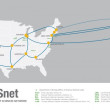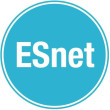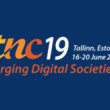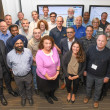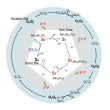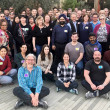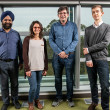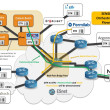ESnet News
The Technological Heavyweight You’ve Probably Never Heard Of: ESnet
Since first coming on line more than 30 years ago, ESnet has expanded to connect more than 40 major research institutions at speeds 15,000 times faster than a home network and acting as an early adapter of protocols that now run the internet. Read More
ESnet a Key Partner on Project to Build Novel Network Research Infrastructure
The National Science Foundation is funding a collaborative effort to create a nationwide research infrastructure that will enable the computer science and networking community to develop and test novel architectures that could yield a faster, more secure Internet. Read More
ESnet Welcomes New Hires in June/July
ESnet continues to grow. Read on to learn a little more about the new staff supporting our mission. Read More
Scott Mason Retires After 20 Years With ESnet
Scott Mason is retiring after 20 years with ESnet. Until Scott Mason joined ESnet in 1999, he’d never actually had a job interview, though he already had a long and interesting career behind him. Mason joined the Navy right out of high school and became a specialized saturation diver working on heavy salvage—sunken ships and fighter planes. After eight years in the Navy, Mason was recruited… Read More
ESnet Staff to Share Networking Expertise at 2019 TNC Conference
Several ESnet staff are participating in the upcoming TNC conference, to be held June 16-20 in Tallinn, Estonia. Read More
ESnet Welcomes New Hires in May
ESnet continues to grow. Read on to learn a little more about the new staff supporting our mission. Read More
ESnet6 Design Enters Homestretch
ESnet passed another major milestone on the way to building the Department of Energy's next-generation, exabyte-scale science network. Known as ESnet6, the project was put through a final design review by an independent panel of experts in networking, research, and science, held May 15-17 at Lawrence Berkeley National Laboratory. Read More
Superfacility Framework Advances Photosynthesis Research
For more than a decade, a team of international researchers led by Berkeley Lab bioscientists has been studying Photosystem II, a protein complex in green plants, algae, and cyanobacteria that plays a crucial role in photosynthesis. They’re now moving more quickly toward an understanding of this three-billion-year-old biological system, thanks to an integrated superfacility framework established between LCLS, ESnet, and NERSC. Read More
ESnet Welcomes New Hires for March and April
Meet a few of ESnet's new hires from March and April 2019. Read More
ESnet’s Networking Prowess on Display at Singapore Conference
At the Supercomputing Asia 2019 conference (SCA19), held March 11-14 in Singapore, ESnet’s expertise in network design and operation took center stage as ESnet Director Inder Monga delivered a keynote address and the winner of the Data Mover Challenge (DMC) used an approach honed on ESnet's network. In his presentation "Cracking open the network ‘black-box’," Monga discussed an emerging… Read More
ESnet Honored for Innovations in Networking
CENIC has selected ESnet to receive the 2019 CENIC Innovations in Networking Award for R&E Network Partner in recognition of ESnet’s contributions to a number of collaborative initiatives with CENIC, including cybersecurity strategy, network design, and technology adoption. Read More
Women in IT Networking Program Seeking Candidates for SC19
The Women in IT Networking at SC (WINS) program is seeking qualified candidates to join the SCinet volunteer workforce for the Supercomputing 2019 Conference. Read More
Retired ESnet Network Special Projects Group Lead, Michael Scott Collins, has Passed Away
Michael Scott Collins, who led ESnet’s Special Projects Group, passed away on January 27, 2019 surrounded by his siblings in Davis, California. Michael retired in 2011 after 32 years with ESnet and its predecessors. Read More
Science Network Turns Seismic Sensor
In traditional seismology, researchers studying how the earth moves in the moments before, during, and after an earthquake rely on sensors that cost tens of thousands of dollars to make and install underground. And because of the expense and labor involved, only a few seismic sensors have been installed throughout remote areas of California, making it hard to understand the impacts of future… Read More
PerfSONAR, ESnet6, High-Touch Services Among ESnet’s 2019 Summer Student Projects
ESnet is now taking applications for 2019 summer internships across a number of exciting network research projects, including ESnet6, PerfSONAR, high-touch services, open source libraries and GNpy. Read More
ESnet Among Five Groups Honored with SCinet Spirit of Innovation Award
Five organizations in particular were instrumental in delivering 800 gigabits per second of long-haul bandwidth to the SC Conference this year, and they are being recognized with the SCinet Spirit of Innovation Award. Read More
SCinet 2018: A High-Capacity Network for HPC Unveiled in Dallas
ESnet staff are once again contributing their expertise to build and operate SCinet, one of the most powerful and advanced networks in the world that is created annually to bring high-speed networking capabilities to the Supercomputing Conference. Read More
ESnet to Support Leading-Edge Demos at SC18
ESnet staff will be working with other research organizations and vendors to support a series of demos at the forefront of networking, including the use of new hardware and software. Here are three key demos supported by ESnet: Making SENSE of Software Defined Networking In collaboration with two universities and three national laboratories, ESnet will demonstrate its Software-defined network for… Read More
Helping SC18 Make All the Right Connections
Every November, thanks to the volunteer efforts of hundreds of network experts, the SC conference becomes one of the best-connected sites on the planet. When SC18 convenes Nov. 11 in Dallas, the SCinet team, including staff from ESnet, NERSC and the lab's IT Division, will have spent the previous year preparing for the event. Read More
OSCARS Upgraded to Support Big Science Collaborations
The Energy Sciences Network’s (ESnet’s) award-winning OSCARS (On-demand Secure Circuits and Reservation System) has just been upgraded. The tool, now called OSCARS 1.0, allows network engineers to make multi-point bandwidth reservations and features a new programmable API and graphical user interface. OSCARS is a software service that creates dedicated bandwidth channels for scientists who… Read More


